How to create lifestyle images for e-commerce using Dondo AI


A complete guide to using and creating lifestyle images for e-commerce with Dondo AI
1. The power of visual storytelling
Imagine scrolling through a product page. You see a candle on a white background, clean and simple. Then you see another image: the same candle glowing beside an open book, a cup of tea, and soft afternoon light. That image doesn’t just show a product, it invites you into a moment, a feeling you want to have.
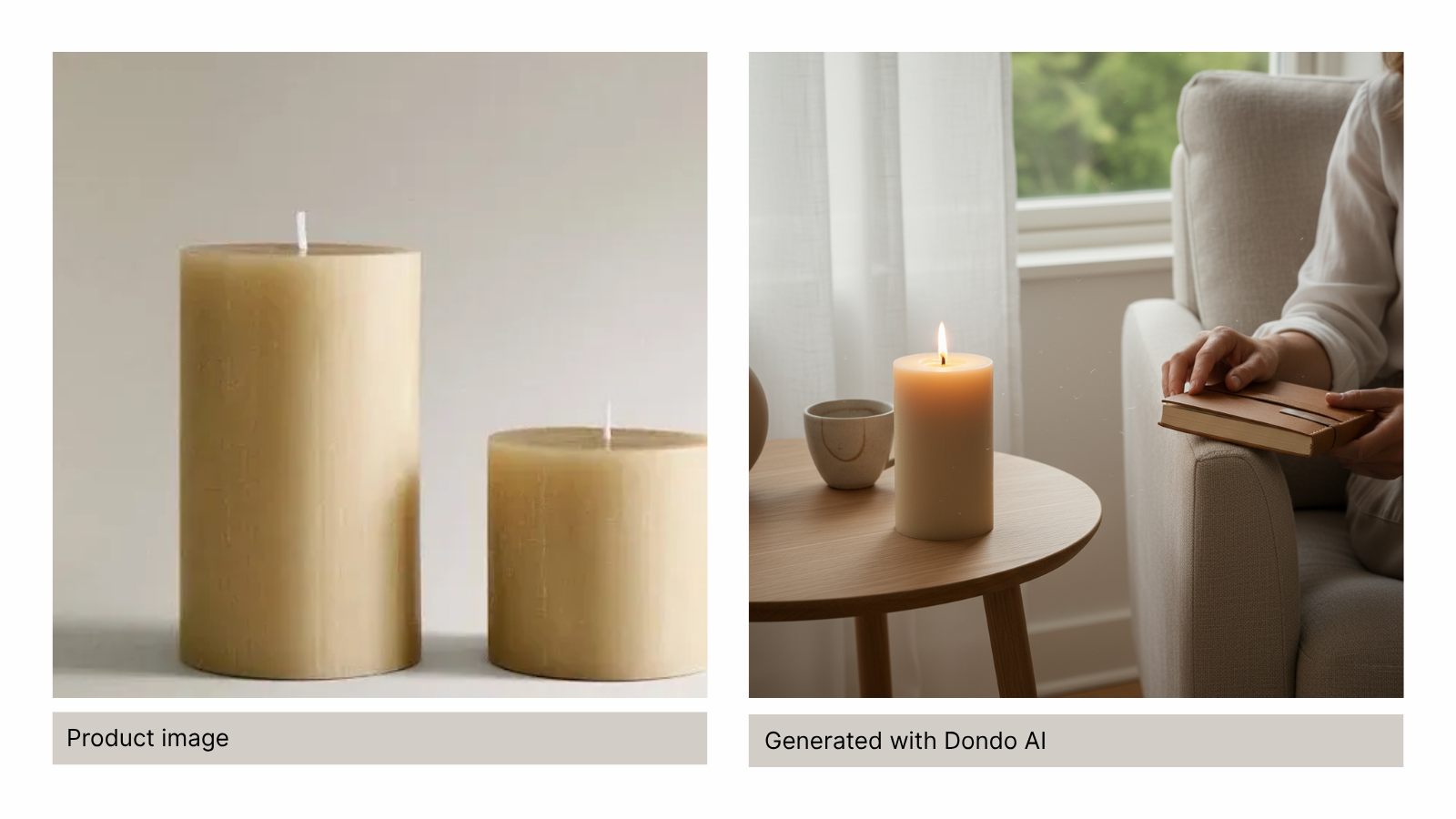
That is the power of lifestyle imagery. It presents what you sell in a way that helps people imagine themselves living with the product. In e-commerce, that difference is what turns interest into emotion, and emotion into action.
In this article, you’ll learn what lifestyle images are, why they matter, the different types that exist, and how to create your own easily using Dondo’s AI.
2. What is a lifestyle image?
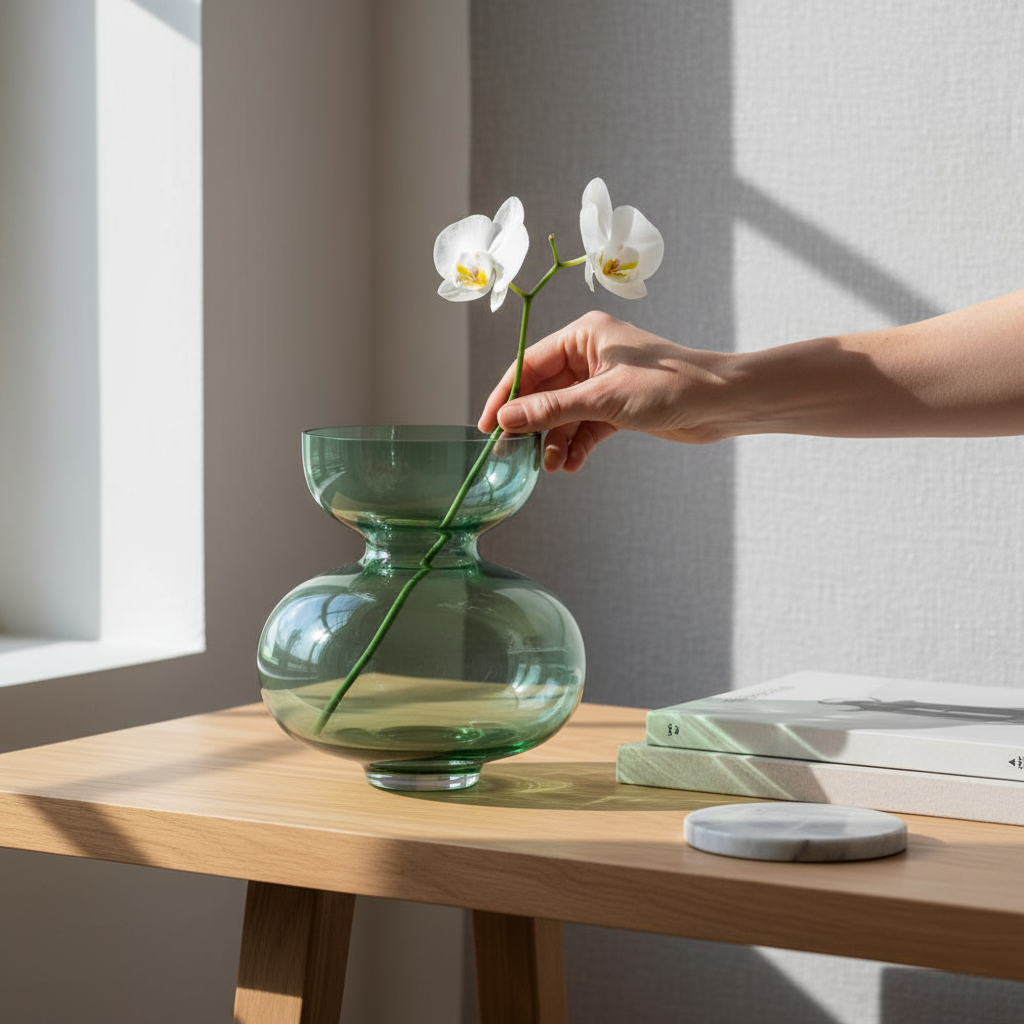
A lifestyle image is a photograph that shows your product in use or within a real or aspirational setting. It places the product in a meaningful context, illustrating how it is used, how it fits into daily life, and how it interacts with spaces, objects, and people.
Lifestyle images help customers perceive important details such as scale, color, and texture under natural light. Unlike studio photos on a plain background, they reveal how the product truly looks and feels when integrated into everyday environments.
But beyond simply showing the product, lifestyle imagery conveys the experience of using it. It allows the audience to understand its purpose and imagine themselves enjoying it in their own environment or as part of a lifestyle they aspire to.
3. Why lifestyle images matter in e-commerce
Lifestyle images do more than make your store look beautiful. They help people feel something about your brand and your products. In e-commerce, that emotional connection often makes the difference between a scroll and a sale.
According to Wowcontly, product pages with lifestyle images saw a 40% increase in conversion rates compared to those without.
Here are the key reasons to include lifestyle imagery in your visual strategy:
- ❤️ They create emotional connection
When customers see a product in a relatable or aspirational moment, they imagine themselves in that story. A well-crafted lifestyle image evokes desire, comfort, or curiosity, the emotions that drive purchasing decisions. - 🎨 They strengthen brand identity
Every visual choice communicates something about who you are as a brand. The setting, colors, and tone of your lifestyle images shape how customers perceive your values and personality. Over time, this visual consistency builds recognition and trust. - 🪞 They improve engagement and conversion
Lifestyle visuals capture attention faster than plain product shots. They perform better on product listings, social media, and ads because they make the experience more human and relatable. Shoppers stay longer, click more, and buy more often when they can imagine themselves in the picture. - 📦 They reduce uncertainty and returns
By showing products in real contexts, lifestyle images help customers understand better size, use, colors, and proportions. This visual clarity reduces hesitation before buying and minimizes returns afterward, since customers know exactly what to expect.
4. Types of lifestyle images
There isn’t just one style of lifestyle photography. There are different variations that differ in composition, the story they tell, and the role they play within a brand’s visual strategy. Each type is designed to evoke a specific emotion and help customers connect with the product in different ways.
Choosing the right type of image will depend on your product, your audience, and the feeling you want to convey.
a. Everyday-use
These images show the product naturally integrated into daily routines. Think of a backpack during a morning commute or a coffee mug on a quiet breakfast table. They make the product feel familiar, approachable, and part of real life.
This style works very well to create a sense of closeness and for building trust and relatability.
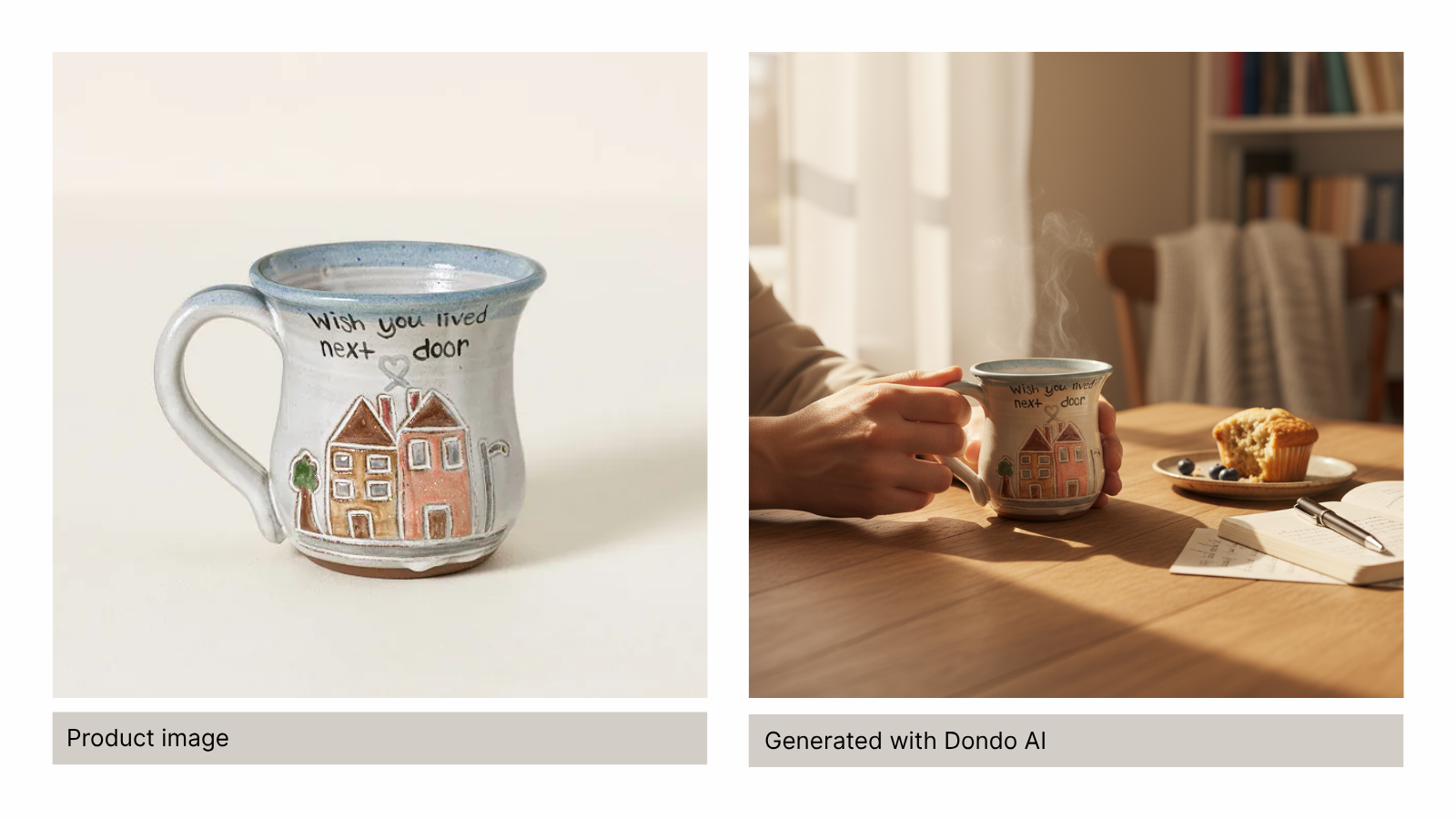
b. Aspirational setting
These images tell a story and evoke an emotional response. Instead of simply showing the product, they place it in a meaningful environment that represents a desirable lifestyle, whether that’s adventure, creativity, comfort, or luxury. The goal is for the viewer to imagine themselves in the scene and feel inspired to adopt that lifestyle.
These images are particularly effective for hero banners, brand storytelling, and products where identity and personal values influence the purchase decision.
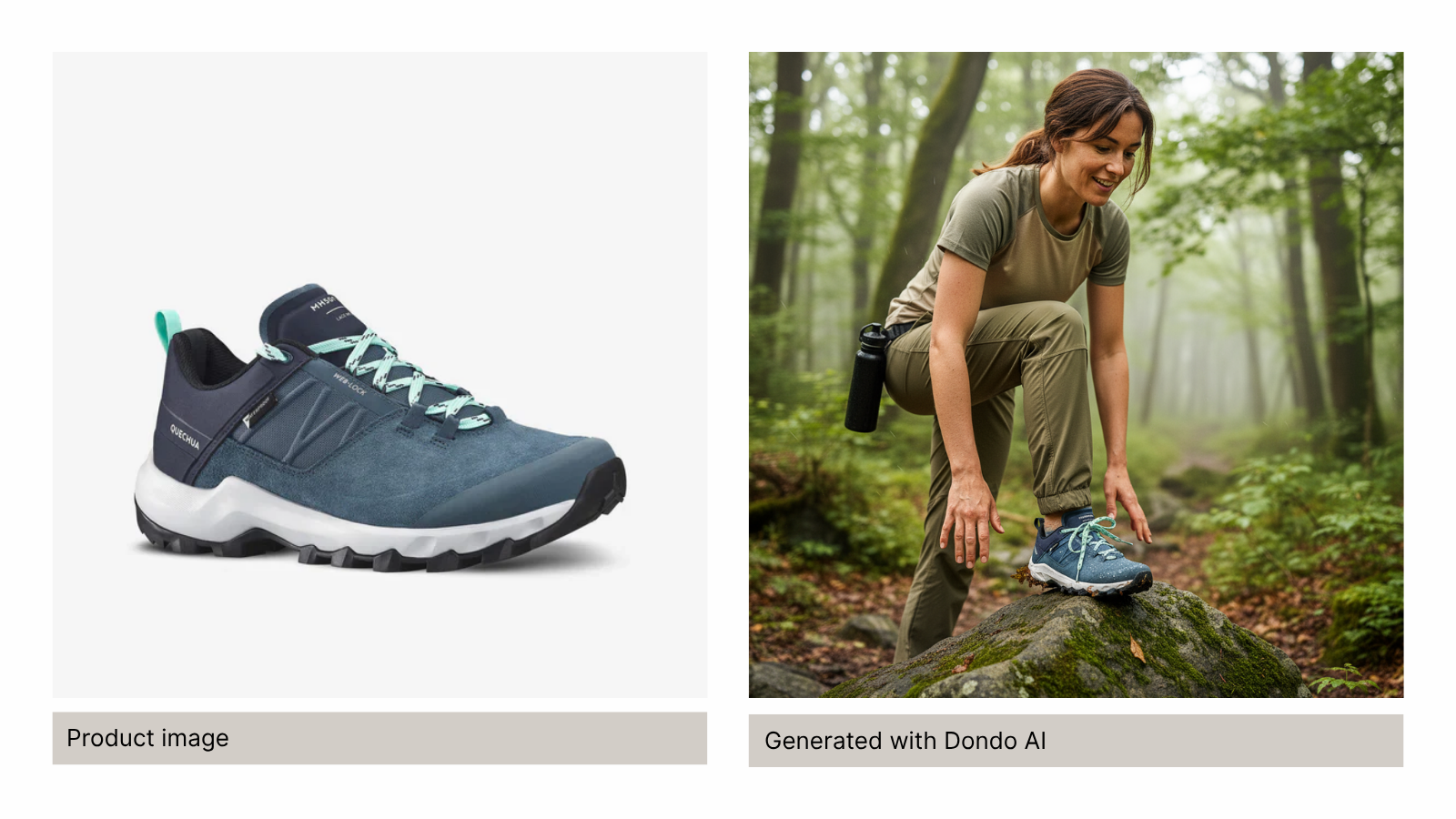
c. Social setting
These images highlight the product in shared or social situations such as group hikes, family gatherings, weekend markets, or meetups with friends. They communicate connection and belonging, showing how the product enhances moments with others.
This style works especially well for community-driven brands or products that benefit from being experienced together.
d. Flat-lay or styled setup
These are carefully arranged compositions where the product is placed on a surface along with complementary objects, textures, and colors. The focus is on aesthetics, balance, and visual storytelling.
They are ideal for product detail shots, blogs, promotional graphics, and social media feeds.
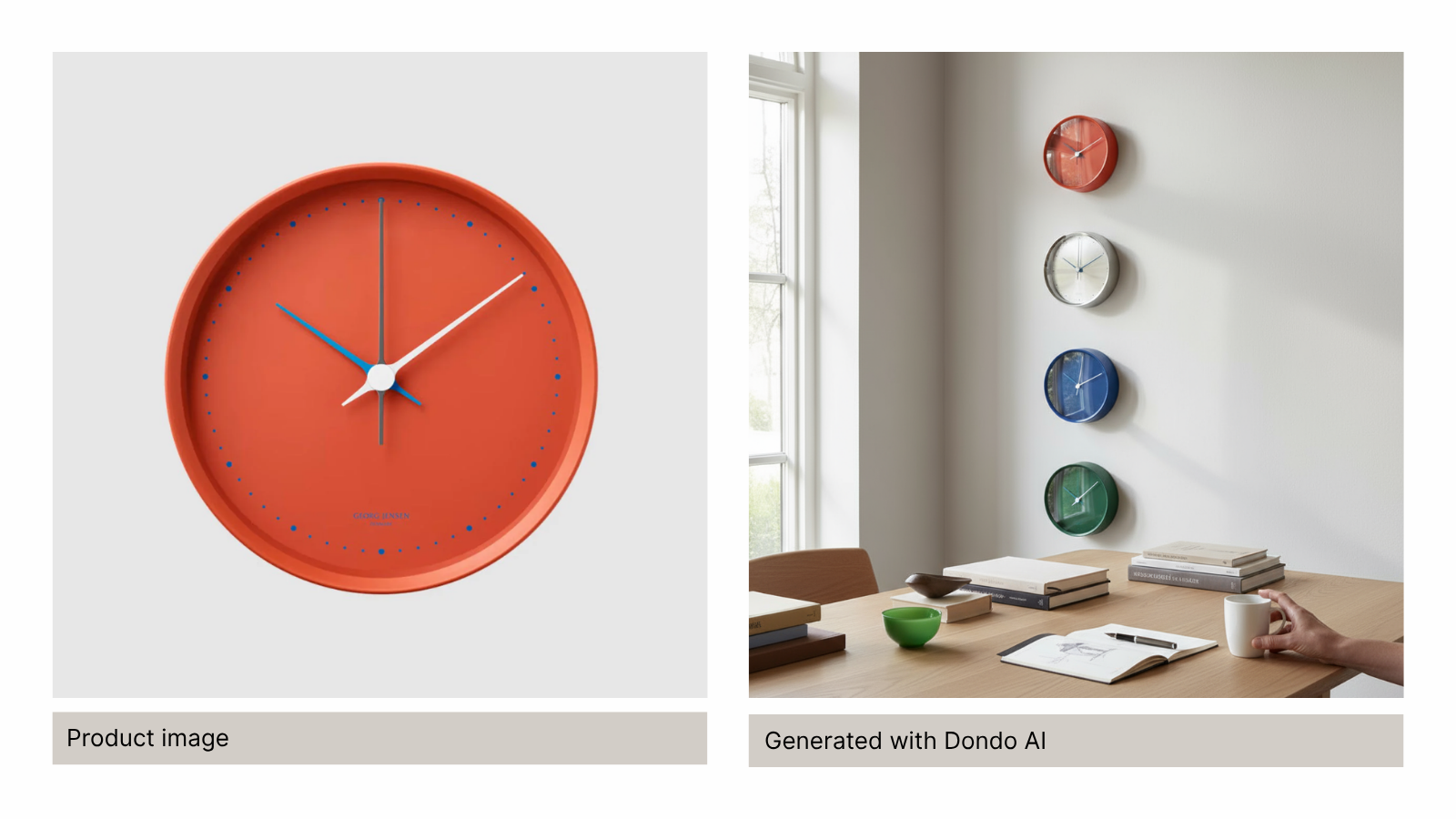
e. Model-led photography
These images feature real people interacting with the product, making it easy to understand scale, fit, and usability.
This approach is especially effective for apparel, accessories, beauty items, and wearable tech, helping customers visualize themselves using the product in their own lives.
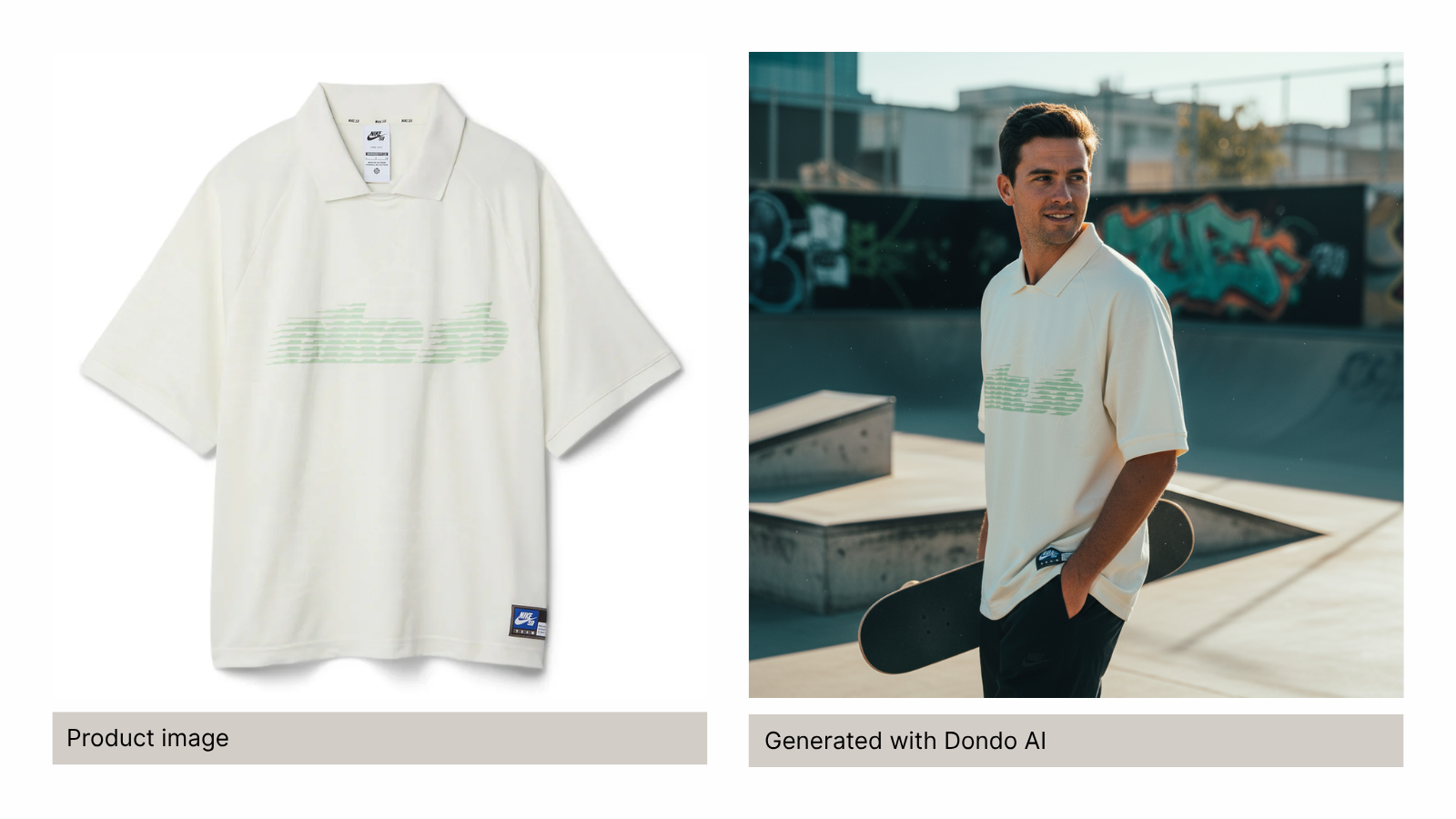
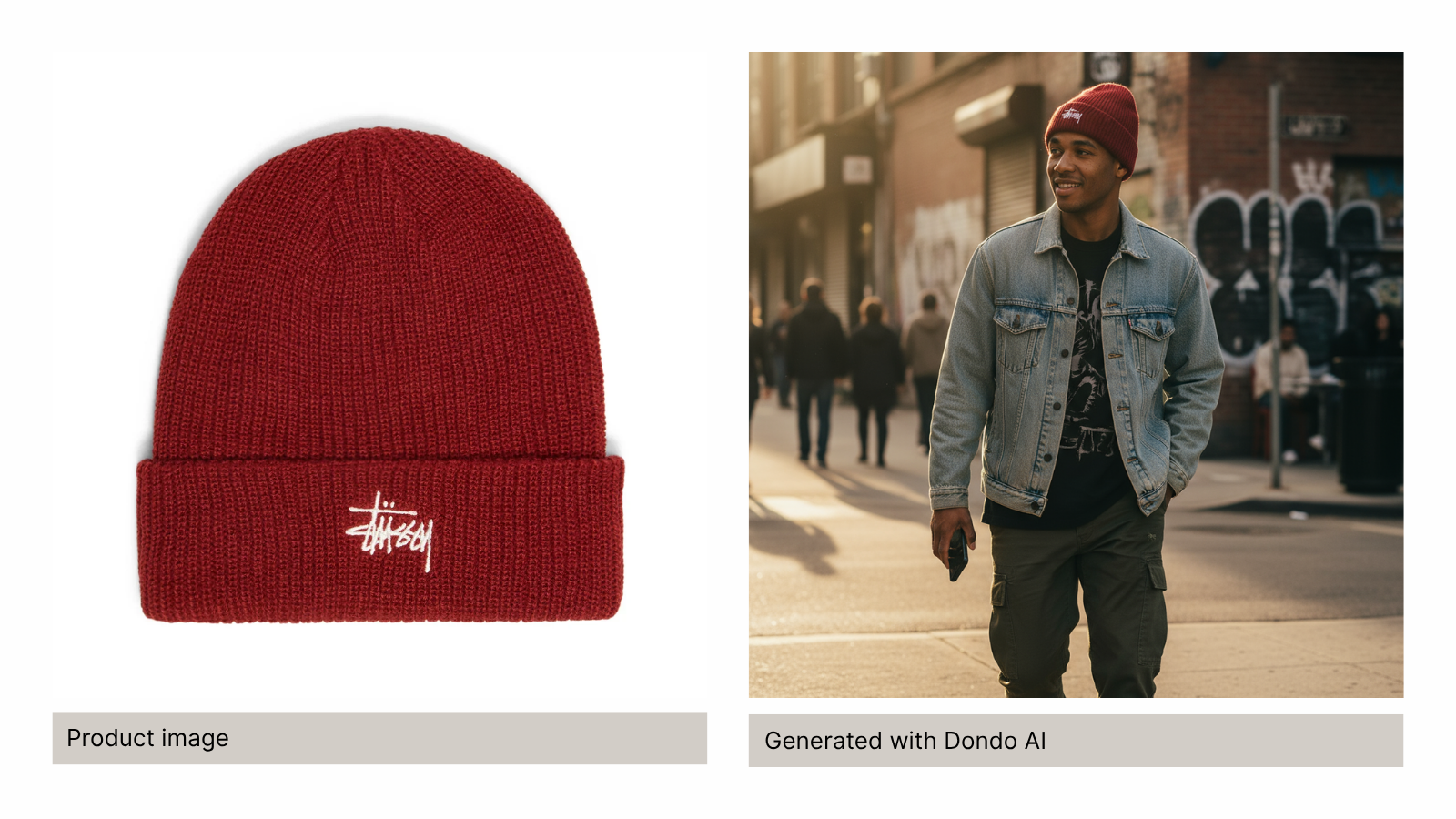
5. How to create lifestyle images
E-commerce brands typically have two options for creating product visuals:
a. Producing their own photo-shoots:
- ☑️ This option allows full creative control and produces highly tailored images that align perfectly with the brand, resulting in unique and original visuals.
- ✖️ However, creating them is expensive and time-consuming. It requires coordinating a director, photographers, models, stylists, and editors, and can be difficult to scale for large catalogs or frequent product launches.
b. Using photos provided by suppliers:
- ☑️ Is inexpensive and requires minimal time or resources, making it convenient for quickly populating product listings.
- ✖️ The drawback is that these images are generic, often appear in multiple stores, and are not aligned with the brand. This can make products look less distinctive and limit creative control.
This is why many brands are turning to AI solutions, which make it possible to create professional lifestyle visuals efficiently and at scale:
c. Using Dondo AI:
- ☑️ This approach delivers high-quality visuals at a fraction of the cost and with minimal effort.
- ☑️ It combines creative freedom, brand alignment, and scalability in a way that neither traditional shoots nor vendor photos can.
The table below compares these three methods and shows why Dondo AI has become the preferred solution for modern e-commerce teams that want to scale visual content without sacrificing creativity or authenticity.
| Aspect | Traditional photography | Vendor photos | With Dondo AI |
| Time | Production can take days or weeks | Instant access, but limited variety | Multiple images generated in seconds |
| Cost | High costs (photographer, models, editing, location) | Free or included from the supplier | Unlimited generation included in your plan |
| Tone and style | Requires creative direction to align the shoot with the brand’s tone and style | Generic photos that are not aligned with your brand’s visual identity | Dondo extracts your brand voice and uses it to generate visuals that match your style and identity |
| Audience alignment | Needs manual research and art direction to match the visuals to the target audience. | Not personalized for your store’s buyers | Automatically analyzes and identifies your buyer persona to create images with relevant models and settings |
| Differentiator | Unique, standout images when well produced | Images are repeated across many stores. No differentiation. | Dondo evaluates your main competitors to ensure your visuals stand out in your niche |
| Consistency | Highly dependent on creative direction and editing | Inconsistent across different products | Provides automatic consistency across your entire catalog |
| Flexibility | Limited to what is captured during the shoot | No flexibility, you can only use the images provided | Full flexibility to generate new images with different contexts, models, and compositions |
| Sustainability | High resource consumption (travel, materials, energy) | Neutral | Sustainable, reducing the need for physical photo shoots and waste |
| Emotional impact | High imapact, but expensive to achieve | Minimal impact | High impact: authentic, scalable visuals aligned with your brand story |
6. Why Dondo Changes the Game
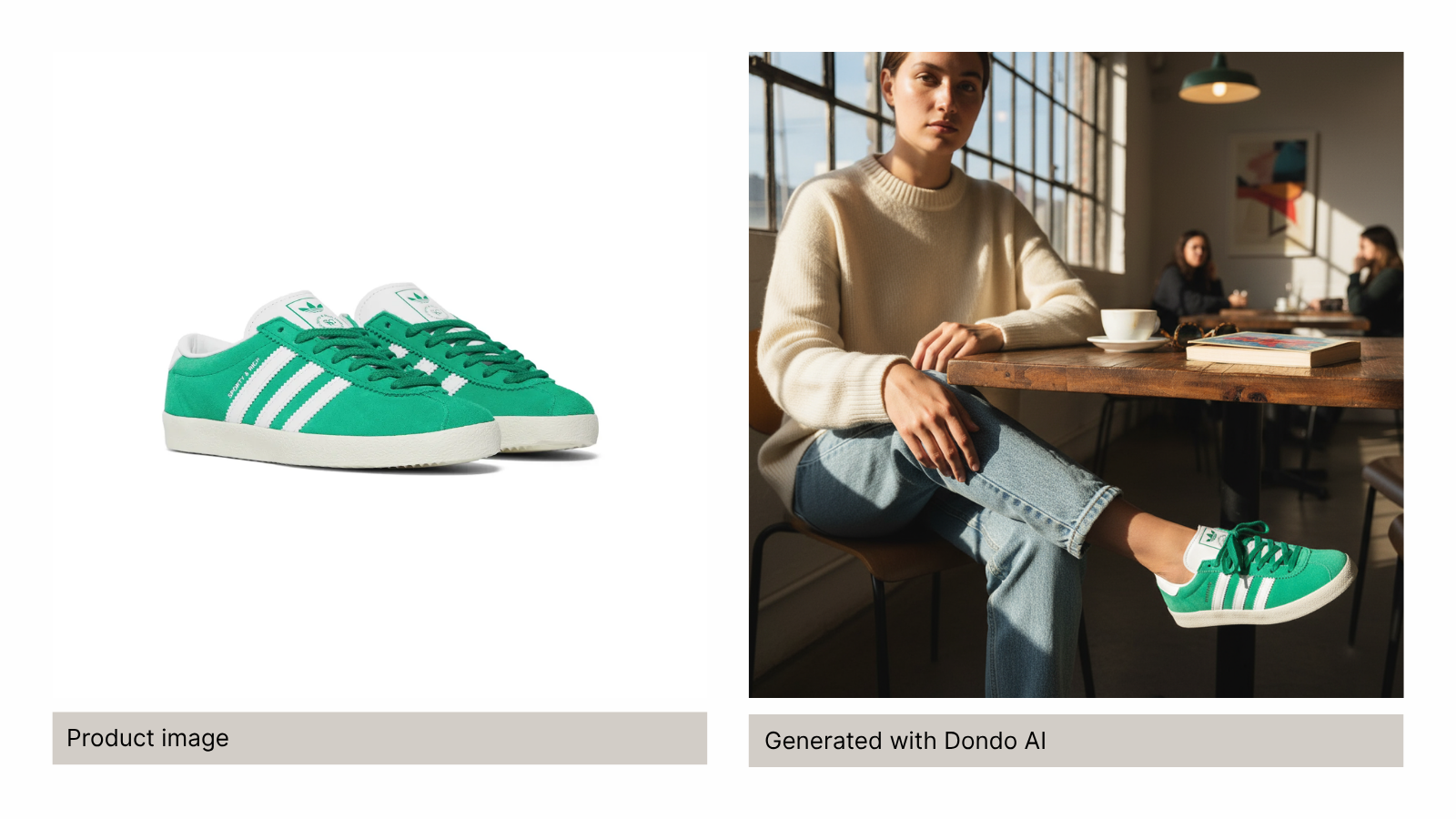
With Dondo, you can generate realistic, high-quality lifestyle images in seconds, without having to coordinate or pay photographers, models, or editing teams. It uses your own product images as the base to create styled visuals that are consistent with your brand, reflecting your store’s tone, audience, and positioning.
Dondo uses your website URL to extract your brand voice, audience insights, and competitor context, producing lifestyle images that are personalized, authentic, and visually appealing and consistent.
Dondo delivers professional results in seconds, turning a complex and time-consuming process into something simple, scalable, and sustainable for your business.
7. How to generate lifestyle images with Dondo
With Dondo’s AI Image Generator, you can easily and quickly create lifestyle images using your product photos.
After creating your account and connecting your store, enter your store name and URL so Dondo can extract your brand voice, analyze your buyer persona, and review your competitors. With this context, Dondo’s AI will optimize your product content (titles, descriptions, SEO metadata, and keywords) and allow you to generate lifestyle images that align with your brand’s style, featuring models and settings that feel familiar and appealing to your audience, and helping you stand out from competitors selling similar products.
How it works
Open the product you want to create a lifestyle image for.
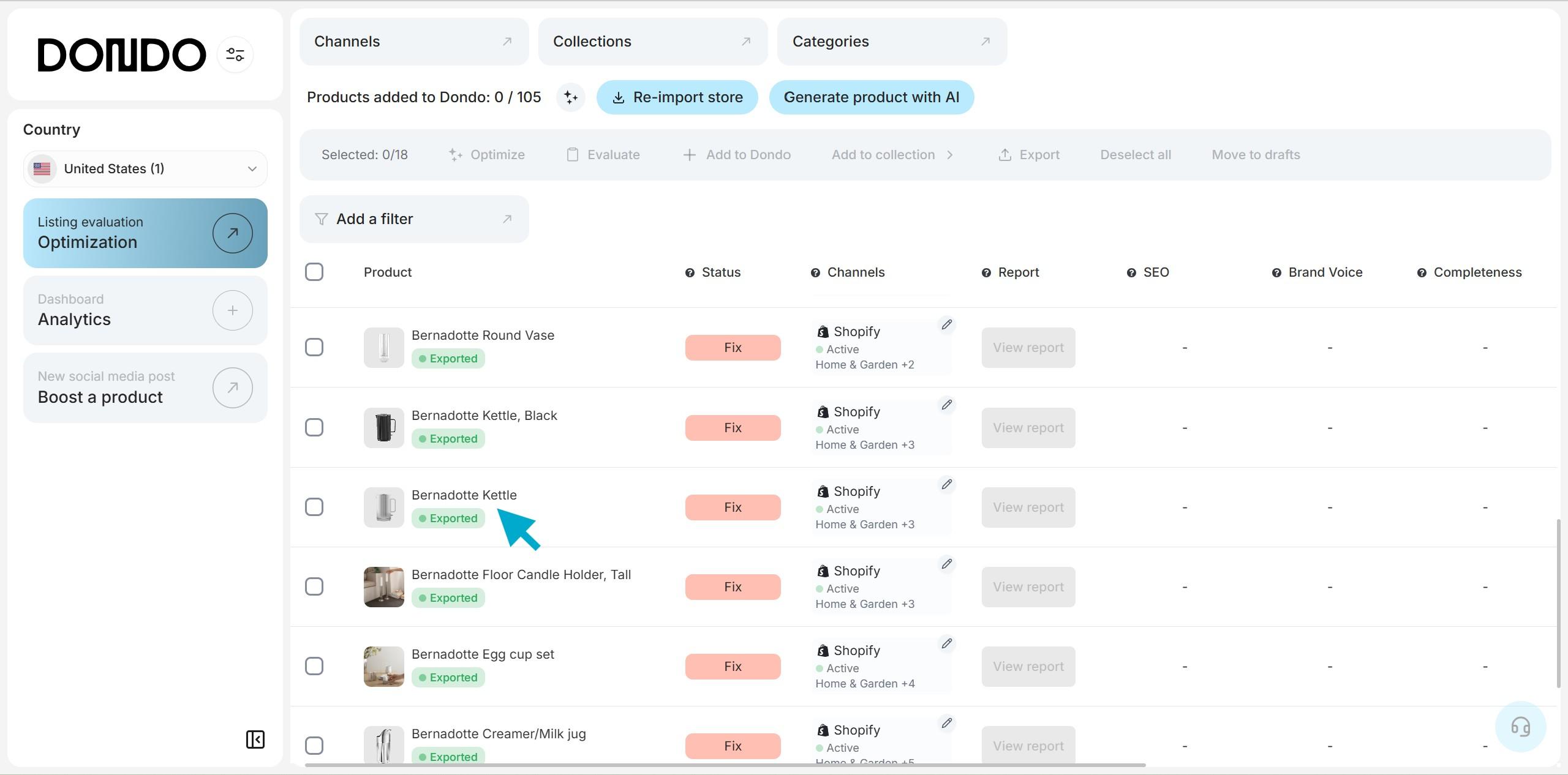
Click the bottom “Generate lifestyle picture” next to your product photos.
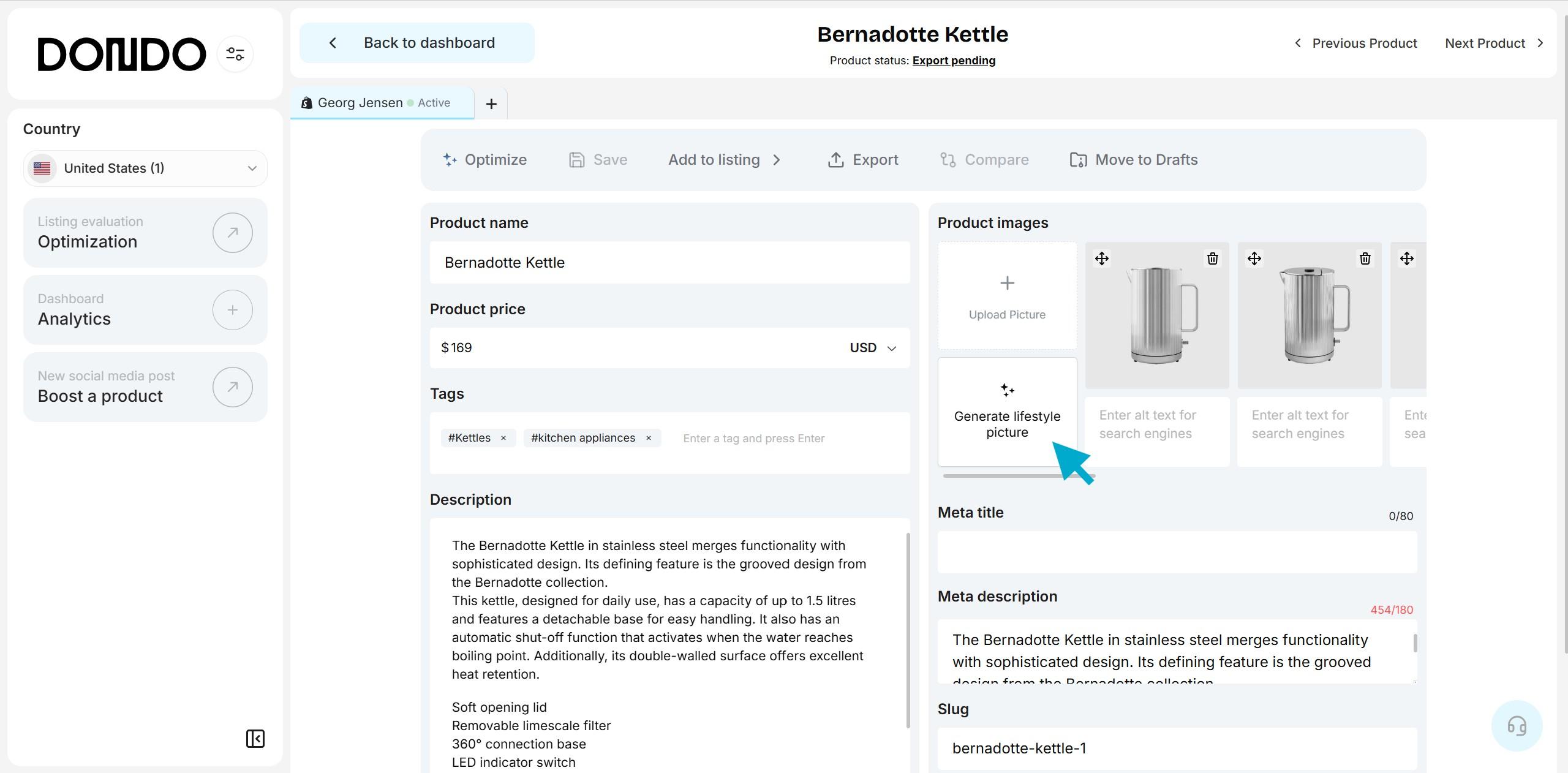
In a few seconds, your new lifestyle image will be ready.
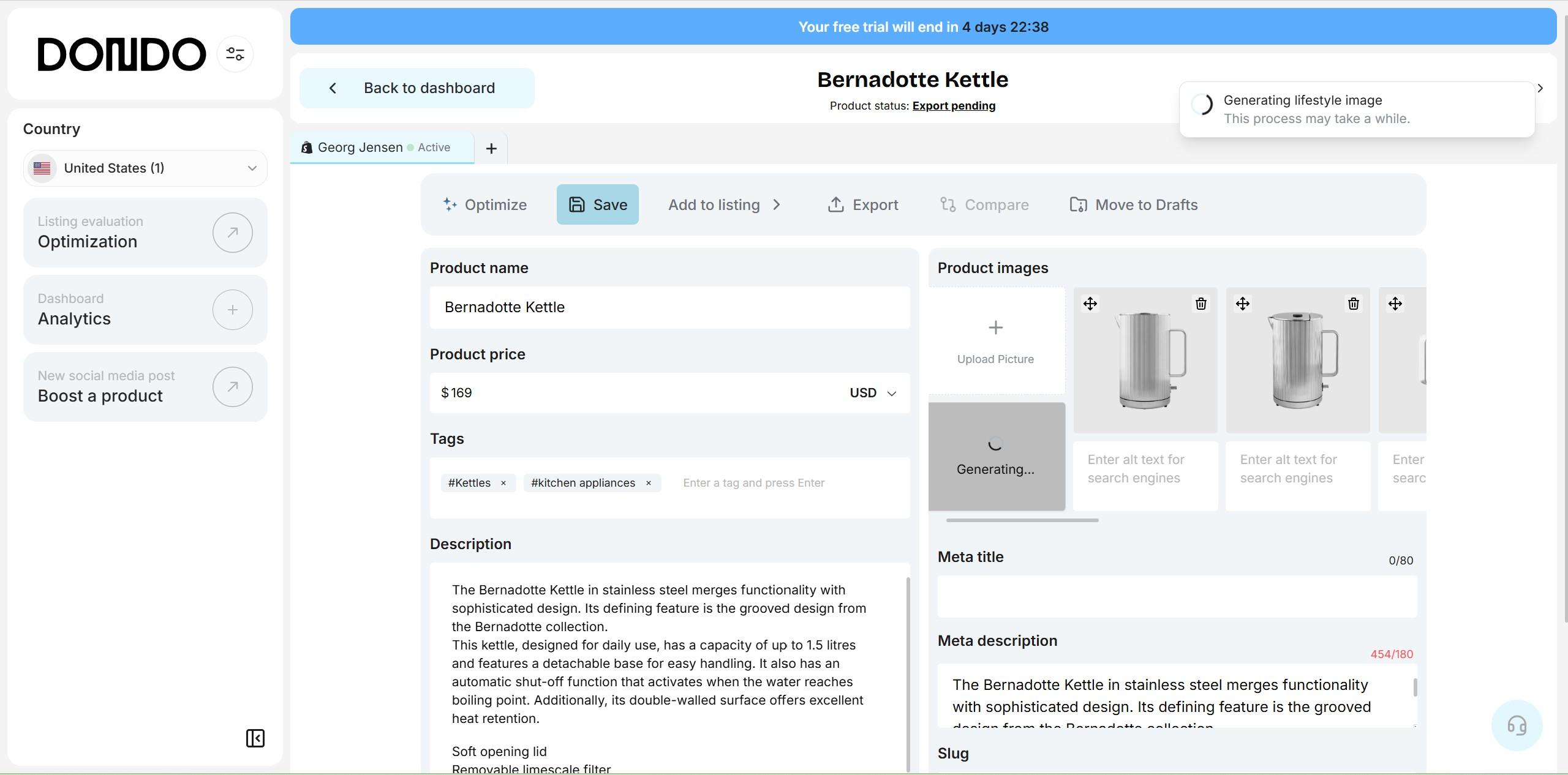
Review it in detail by clicking on the image.
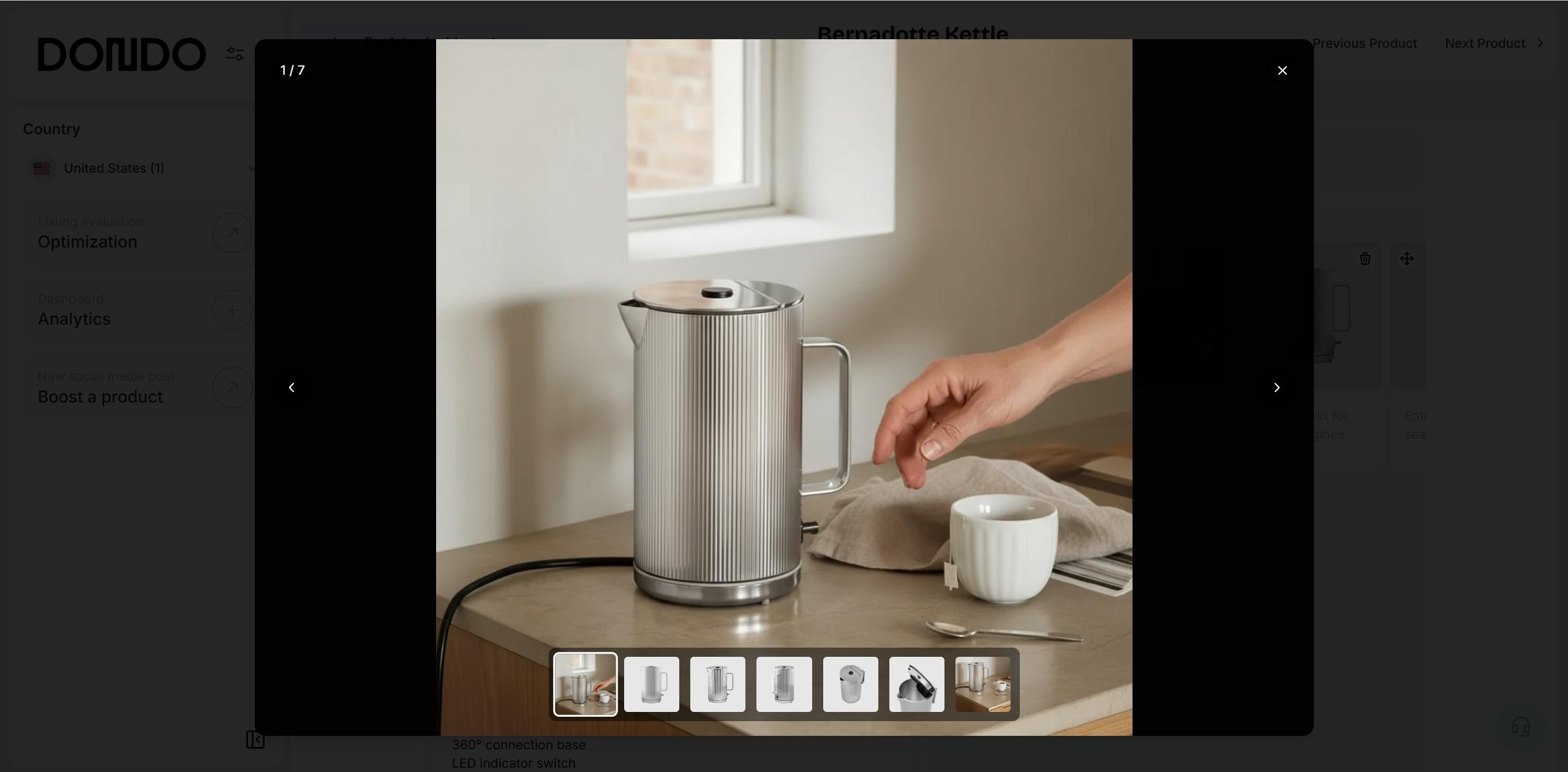
If you’re not satisfied, you can delete it and generate a new one.
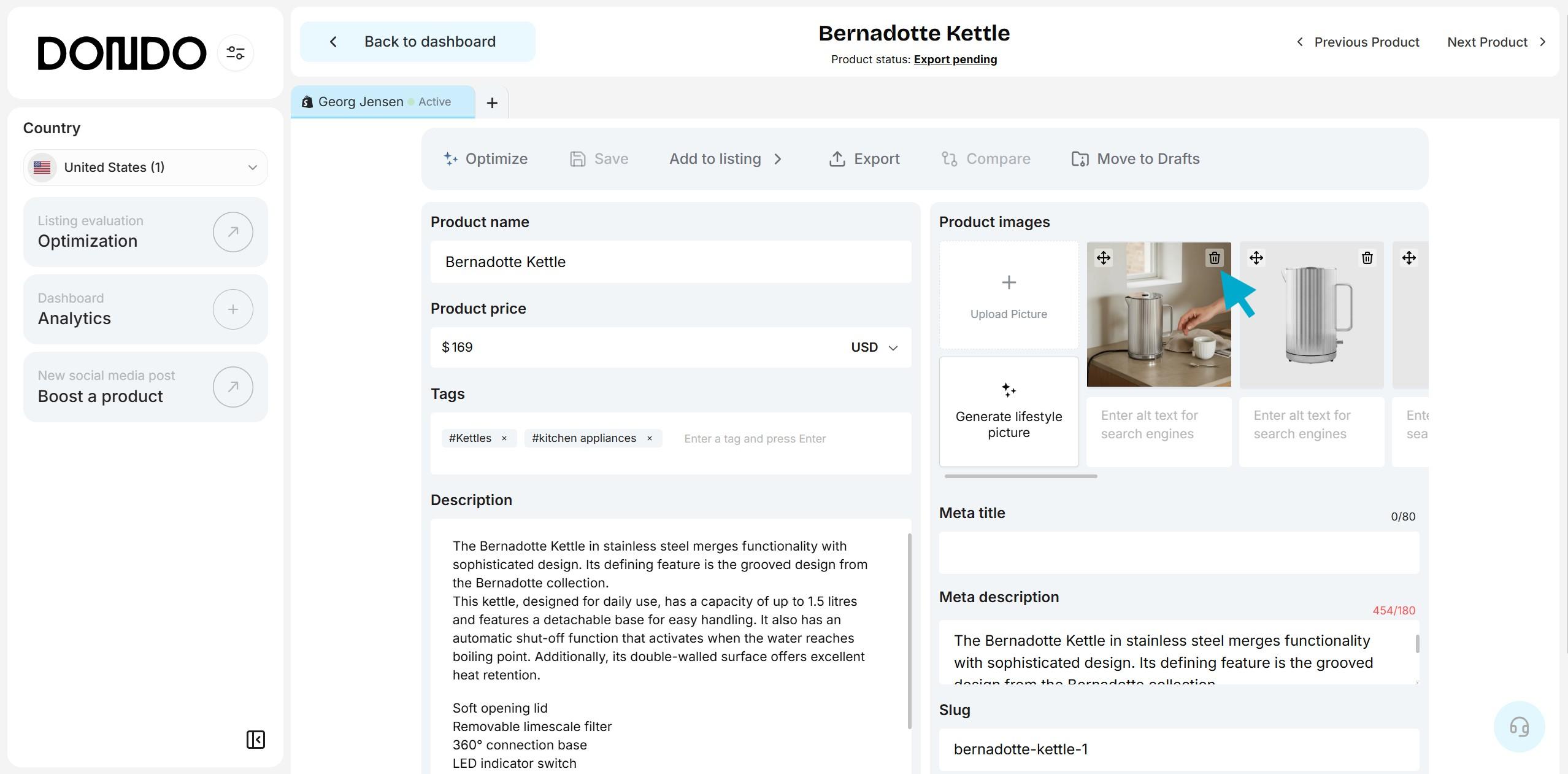
Use the arrows to reorder your product images and move the lifestyle photo to your preferred position.
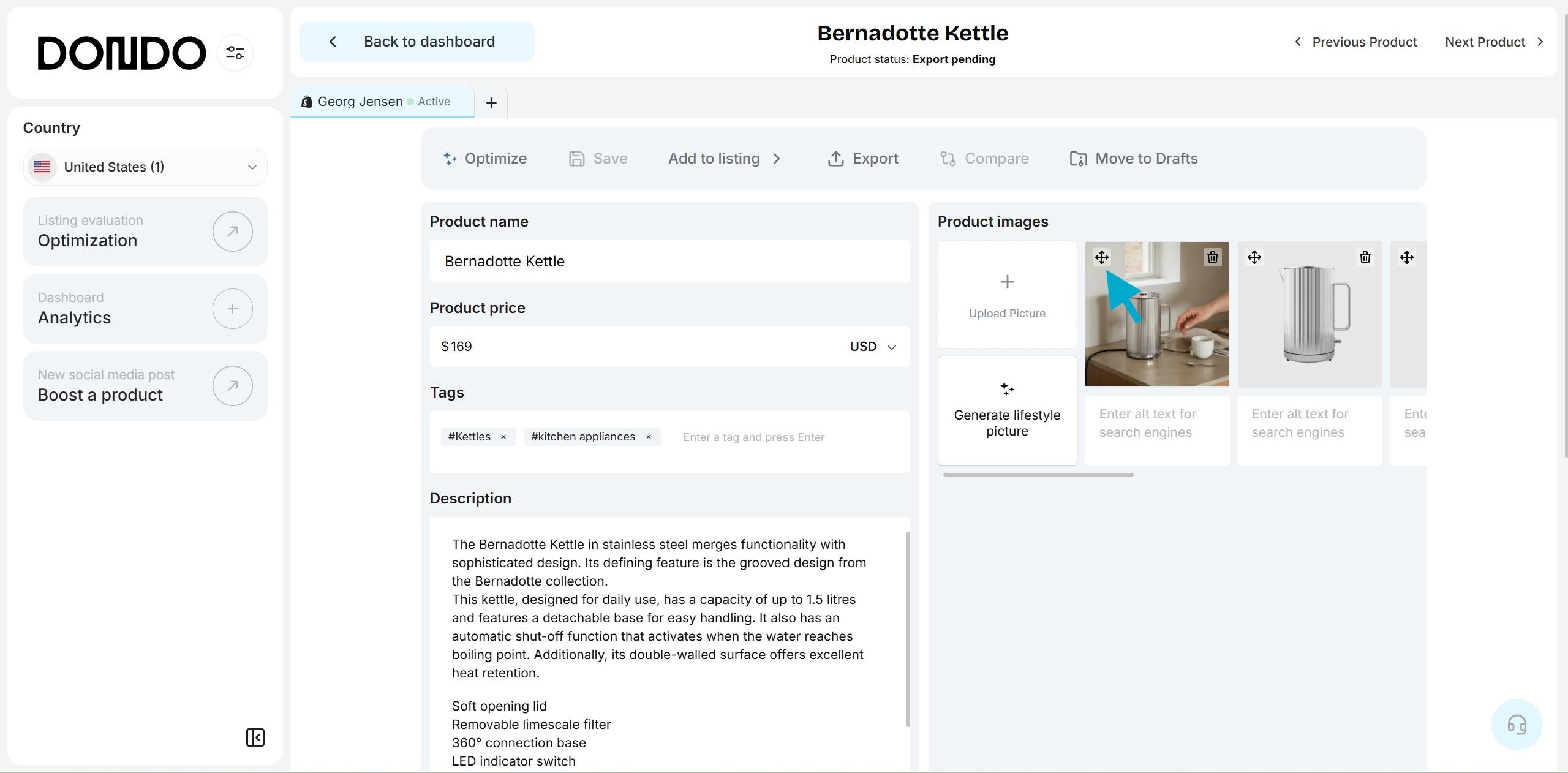
When you're done, don’t forget to export the product to your store so the updates and new images appear on your website.
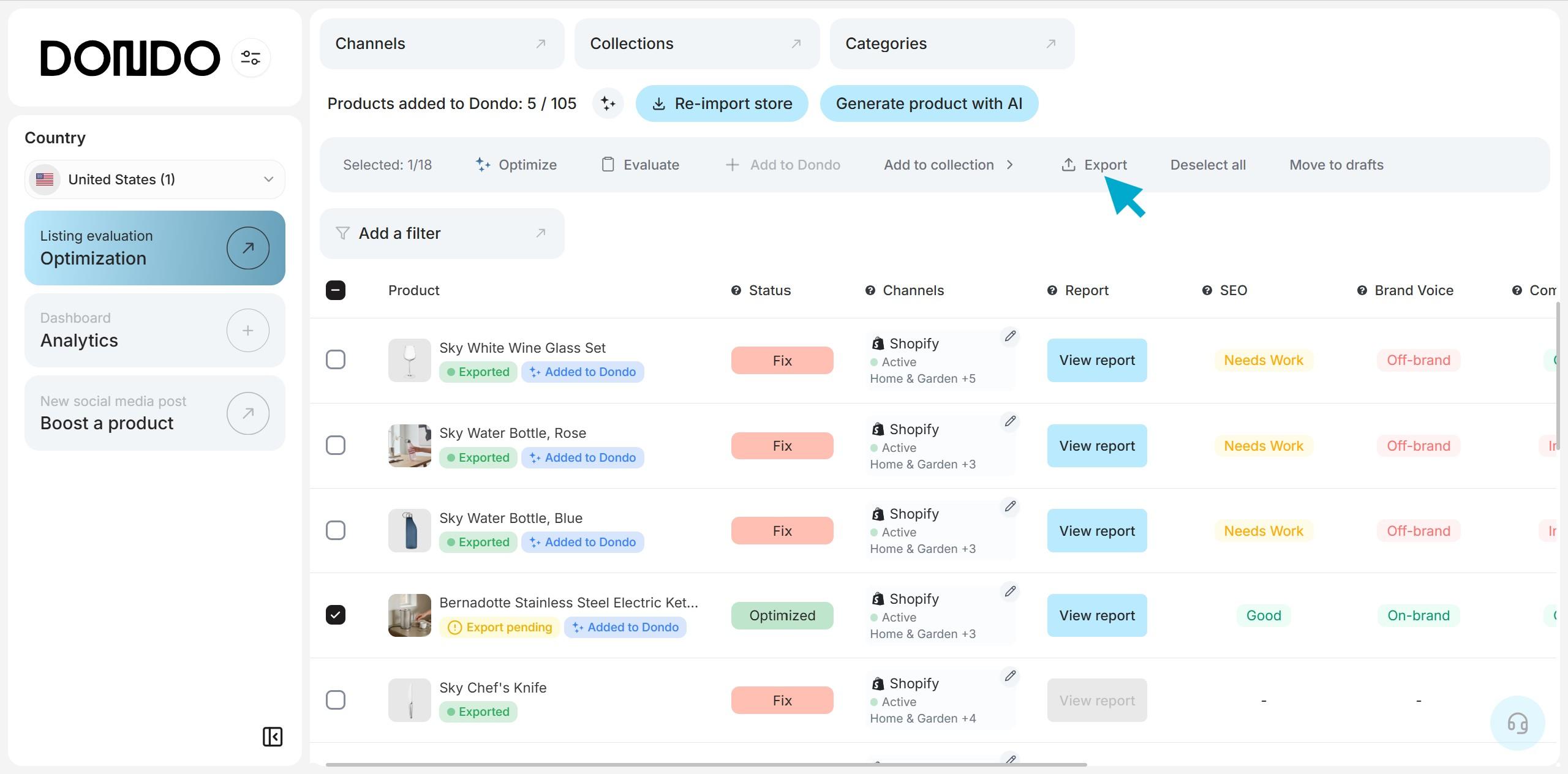
Dondo makes it effortless to create lifestyle visuals that look authentic, professional, and on brand. In seconds, your products can appear in realistic, emotionally engaging settings with no photo shoots, no editing teams, just high-quality visuals ready to inspire customers.
